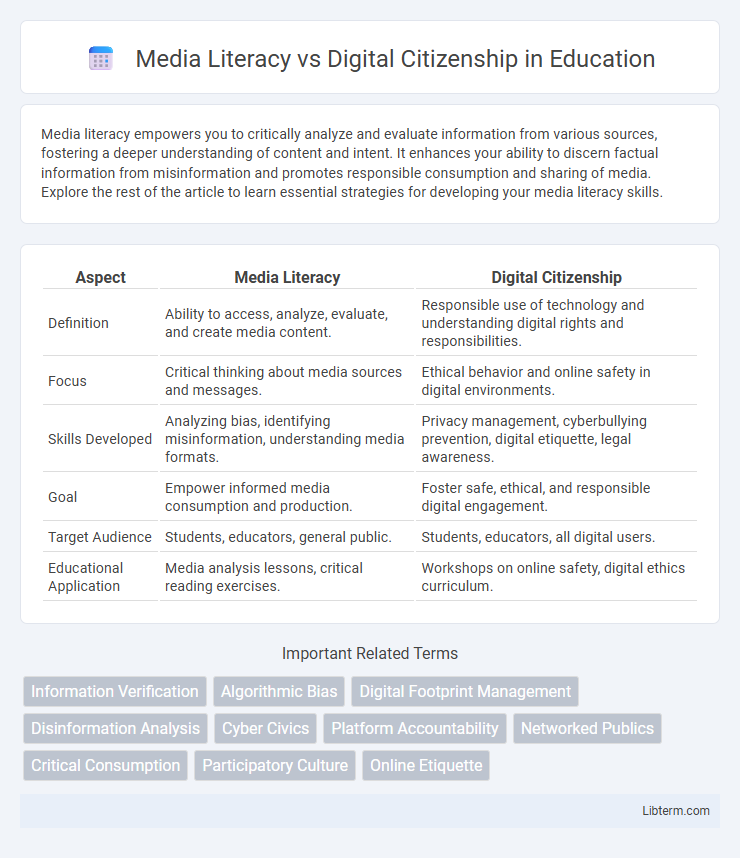Media literacy empowers you to critically analyze and evaluate information from various sources, fostering a deeper understanding of content and intent. It enhances your ability to discern factual information from misinformation and promotes responsible consumption and sharing of media. Explore the rest of the article to learn essential strategies for developing your media literacy skills.
Table of Comparison
| Aspect | Media Literacy | Digital Citizenship |
|---|---|---|
| Definition | Ability to access, analyze, evaluate, and create media content. | Responsible use of technology and understanding digital rights and responsibilities. |
| Focus | Critical thinking about media sources and messages. | Ethical behavior and online safety in digital environments. |
| Skills Developed | Analyzing bias, identifying misinformation, understanding media formats. | Privacy management, cyberbullying prevention, digital etiquette, legal awareness. |
| Goal | Empower informed media consumption and production. | Foster safe, ethical, and responsible digital engagement. |
| Target Audience | Students, educators, general public. | Students, educators, all digital users. |
| Educational Application | Media analysis lessons, critical reading exercises. | Workshops on online safety, digital ethics curriculum. |
Defining Media Literacy: Key Concepts and Importance
Media literacy involves the ability to access, analyze, evaluate, and create media content across various platforms, fostering critical thinking and informed decision-making. Key concepts include understanding media bias, recognizing persuasive techniques, and differentiating between credible sources and misinformation. Developing media literacy is essential for navigating the digital landscape responsibly and enhancing overall communication skills.
Understanding Digital Citizenship: Core Principles
Understanding digital citizenship involves recognizing the core principles of responsible and ethical online behavior, including respecting others' privacy, practicing safe internet habits, and engaging in positive digital communication. Key components encompass digital etiquette, critical thinking in evaluating online content, and awareness of cyberbullying and digital rights. Mastering these principles helps individuals navigate the digital world confidently while promoting a respectful and secure online community.
Comparing Media Literacy and Digital Citizenship
Media literacy encompasses the skills to critically analyze, evaluate, and create content across various media platforms, fostering informed and independent consumption of information. Digital citizenship involves the responsible and ethical use of technology and online platforms, emphasizing safe, respectful, and lawful behavior in digital environments. Comparing both, media literacy centers on understanding and interpreting media messages, while digital citizenship prioritizes practicing positive and accountable interactions within the digital community.
The Role of Critical Thinking in Media Literacy
Critical thinking plays a pivotal role in media literacy by enabling individuals to analyze, evaluate, and synthesize information from diverse digital sources effectively. It fosters the ability to discern credible content from misinformation, promoting informed decision-making and responsible consumption of media. Through critical thinking, media literacy supports the development of discerning digital citizens who navigate online environments with awareness and ethical responsibility.
Promoting Ethical Online Behavior through Digital Citizenship
Promoting ethical online behavior through digital citizenship involves cultivating respect, responsibility, and critical thinking about digital interactions. Digital citizenship education teaches users to navigate online environments safely while understanding the consequences of their actions on others, fostering empathy and integrity. Effective digital citizenship programs integrate media literacy skills to empower individuals to discern credible information and avoid harmful content, enhancing overall ethical engagement.
Educational Strategies for Media Literacy and Digital Citizenship
Effective educational strategies for media literacy include critical analysis of sources, identifying bias, and fact-checking techniques to empower students in navigating the complex digital landscape. Digital citizenship education emphasizes responsible online behavior, privacy protection, and ethical use of technology, fostering respectful communication and awareness of digital rights and responsibilities. Integrating project-based learning and interactive workshops enhances students' ability to apply media literacy and digital citizenship skills in real-world contexts.
Navigating Misinformation and Fake News
Media literacy equips individuals with critical thinking skills to identify misinformation and fake news by evaluating sources, checking credibility, and recognizing bias. Digital citizenship emphasizes responsible online behavior, encouraging users to share accurate information and engage respectfully to combat the spread of false content. Combining media literacy with digital citizenship fosters an informed, ethical digital community resilient against misinformation.
Privacy, Security, and Responsible Use in the Digital Age
Media literacy empowers individuals to critically evaluate digital content, enhancing awareness of privacy risks and security threats in online environments. Digital citizenship emphasizes responsible use of technology, advocating for ethical behavior, data protection, and respect for others' digital rights. Together, media literacy and digital citizenship foster informed decision-making and promote safe, respectful interactions in the digital age.
Empowering Youth: Skills for the Digital World
Media literacy equips youth with critical thinking skills to analyze and evaluate digital content, fostering the ability to discern credible information from misinformation. Digital citizenship teaches responsible online behavior, emphasizing ethical communication, privacy management, and digital rights awareness. Combining both skill sets empowers young individuals to navigate the digital world safely, confidently, and effectively.
Future Challenges and Opportunities in Media Literacy and Digital Citizenship
Future challenges in media literacy and digital citizenship include combating misinformation, enhancing critical thinking skills, and adapting to rapidly evolving digital platforms. Opportunities arise from integrating AI-powered tools for personalized learning, fostering inclusive digital communities, and promoting ethical online behavior through targeted education programs. Developing resilient, digitally savvy citizens capable of navigating complex media environments will be crucial for societal progress.
Media Literacy Infographic

 libterm.com
libterm.com